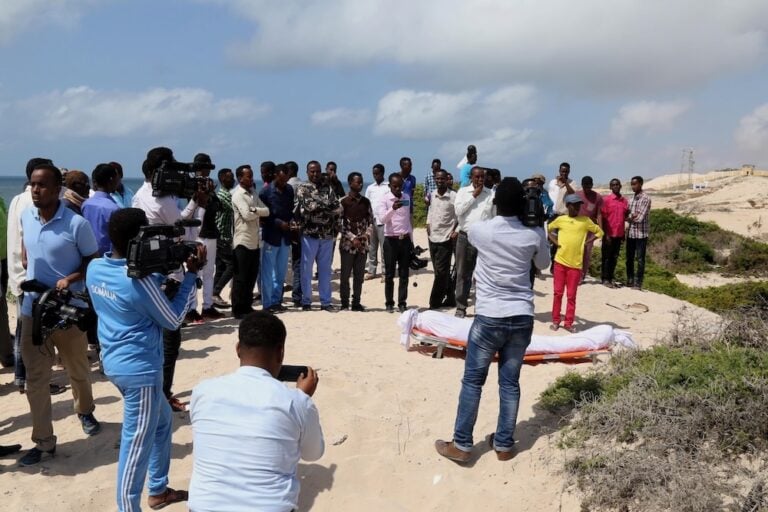In this podcast, representatives from two IFEX member organisations and a group in Somaliland provide context for the recent shutdown of Haatuf newspaper and The Somaliland Times, and consider how and if the trend can be reversed.
UPDATE: According to the Somaliland Journalist Association, Yusuf Abdi Gabobe and Ahmed Ali were released on bail on 27 May 2014.
It’s been a month and a half since two independent newspapers were shut down in the semi-autonomous republic of Somaliland. On 7 April 2014, police occupied the offices of Haatuf newspaper and its sister publication, The Somaliland Times, in the capital, Hargeisa.
The closures came shortly after the newspapers had published articles that allegedly insulted government officials, and soon snowballed into the arrest of Yusuf Abdi Gabobe, chairman of the Haatuf Media Network, and Ahmed Ali, chief editor of the network.
These events have not occurred in a vacuum. In the past few years, authorities in Somaliland have increasingly cracked down on media outlets that criticise the authorities, or report on sensitive issues such as corruption.
In the accompanying podcast, representatives from two IFEX member organisations and a group in Somaliland provide context for the recent shutdown of Haatuf and The Somaliland Times, and consider how and if the trend can be reversed.
The podcast features perspectives from the following individuals:
• Omar Faruk Osman, Secretary-General of the National Union of Somali Journalists (NUSOJ)
• Tom Rhodes, East Africa consultant for the Committee to Protect Journalists (CPJ)
• Mohamed Abdi Gulied (Curad), Vice-Chairman of the Somaliland Journalist Association (SOLJA)
Audio Transcript
Caro Rolando: It’s been a month and a half since police shut down two independent newspapers in Somaliland. On 7 April, police occupied the offices of Haatuf newspaper and its sister publication, The Somaliland Times, in the capital Hargeisa.
Omar Faruk Osman: The uniformed commander, with his own army, came into the place saying, “Look, we have this call to order, and we are shutting you down. Go out of the building.”
CR: That’s Omar Faruk Osman. He’s the secretary-general of the National Union of Somali Journalists, or NUSOJ, which monitors and conducts investigations into violations of press freedom and human rights of journalists. His organisation has been following the shutdown in Somaliland since it began last month. It’s important to note that NUSOJ is based in Somalia, not Somaliland.
Somaliland proclaimed its independence from the rest of Somalia in 1991. It has its own constitution, which guarantees media independence and freedom of expression.
But as is the case with so many countries, the state of press freedom in Somaliland does not necessarily reflect the ideals of the constitution. Last month, Haatuf and The Somaliland Times were shut down, and their websites subsequently blocked. According to Osman, these actions were prompted by articles that allegedly insulted government officials.
OFO: It says that, you know, the minister of mineral resources is misappropriating public funds and the minister of interior is abusing his authority and power.
CR: The shutdown of The Somaliland Times and Haatuf came only four months after another critical, independent publication was ordered to halt its operations. Last December, police occupied Hubaal newspaper’s headquarters after a regional court had banned them from publishing and distributing their paper.
I asked Tom Rhodes, East Africa consultant for the Committee to Protect Journalists, what justification had been given for closing down these outlets. He said that it related to articles Hubaal had published accusing the government of nepotism and misuse of office.
Tom Rhodes: But, you know, again in neither of these cases did the government refute what Hubaal was saying. It was sort of more like, “We just don’t like what you’re saying. It’s anti-state, it’s incitement,” etcetera. It’s the usual story.
CR: Osman, from NUSOJ, points out that it’s difficult for journalists to defend themselves against these charges because most of their sources request anonymity to avoid reprisals. Both he and Rhodes are concerned with how the legal system is being applied in these cases.
TR: At the end of the day, the argument still remains that the government shouldn’t just throw people in jail, shouldn’t just close a media outlet, you know, even attack journalists within the office, like they did in Hubaal, without any recourse to the law, obviously.
CR: The government’s clampdown on critics has worsened since the ruling party came into power in 2011.
HornCable TV, a network based in Hargeisa, was temporarily shut down in 2012 after it aired reports that were critical of the government.
In February, the government banned U.K.-based Universal TV after it aired a comedy show that mocked Somaliland President Ahmed Silanyo.
Prior to these instances, Kulmiye, the ruling party, was an ally of the media.
OFO: Because before, when they were in opposition, they were friendly with the media, very supportive to the media. But when they came into power, in 2011, they changed things. They started, you know, pursuing independent media, having a go at critical media, started arresting TV journalists.
CR: The Somaliland Journalists Association, or SOLJA, monitors the arrests of journalists and media professionals in the region.
In its latest annual report SOLJA states that in 2013, over 45 journalists in Somaliland experienced harassment, intimidation, arrests, assaults or injury.The trend has continued well into 2014. On 10 May, Yusuf Abdi Gabobe, chairman of Haatuf Media Network, and Ahmed Ali, chief editor of the network, were jailed after being charged with libel, false publication, and anti-state propaganda.
The Vice Chairman of SOLJA has expressed concern over the recent arrest of the journalists. In an email to IFEX, Mohamed Abdi Guleid wrote that critical reporting is essential to Somaliland’s democracy.
At this point, no one is certain as to what will happen with the journalists or when Hubaal, Haatuf and The Somaliland Times will be able to resume publishing. In fact, both Osman and Rhodes fear that the shutdowns will be indefinite.
OFO: There is no time frame whatsoever – number one; number two is that the media community there has lost its faith in the judiciary. It’s like, you know, you criticise the minister… prepare yourself. Just prepare yourself because no judge would independently say, “Yeah, this is a legitimate criticism, this is a right to freedom of expression.”
CR: But not all hope is lost. According to Rhodes, Somaliland responds to criticism when it is in the international spotlight.
TR: Somaliland’s a bit of a conundrum, in a way, because, you know, from an advocacy angle, it’s really good in the sense that they really rely on foreign aid and foreign recognition. And so the government is pretty responsive to criticism. It hits them hard.
CR: Rhodes says that a group in Hargeisa, the Human Rights Centre, has already launched a petition, calling for Haatuf and The Somaliland Times to resume publishing again. But it might take more than one petition and one human rights group to condemn the government’s actions in order to get the papers up and running again.
This podcast was produced on 26 May 2014, by Caro Rolando for IFEX – the global network of organisations defending and promoting free expression.



